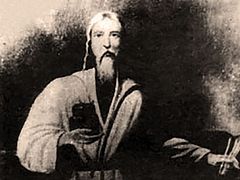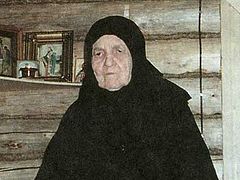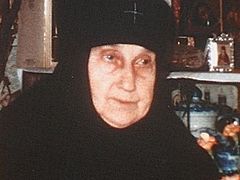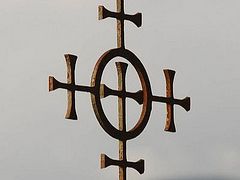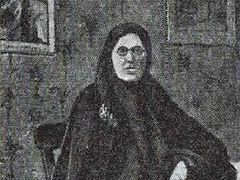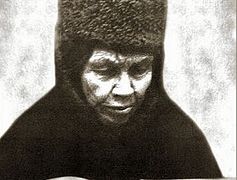Maria Andreevna Velichko (August 4/17, 1852 – June 16/29, 1943), a native of the village of Nikolaevka of the Taganrog district, had come to the blessed Paul of Taganrog five years before he died to ask him if she should marry or become a nun. The female assistants invited her to the room where the elder would receive guests. It was used as a reception room, and an icon of the Mother of God “Nursing the Child” stood there. When she came in, the assistants told her: “During your conversation please look at the icon rather than at Fr. Paul.” But Maria thought: “I will be looking at Elder Paul while he is speaking to me. As for the icon, I will be able to look at it in the church. After all, I worked for a peasant for two days in summer so that he would take me to the elder.” When Fr. Paul came, he looked at her and said: “Oh, girl, you will even die in my house! I will give you a black dressing gown and a black headscarf. You will live in my community and nobody will know about it.”
The blessed elder took pains to ensure that one of his most zealous female disciples developed spiritually. Thus, the book Blessed Paul of Taganrog contains the following of Eldress Maria’s reminiscences of her relationship with the elder in those years:
“Once one of the benefactors brought some pressed caviar for the elder. In the evening, when I went to bed after my prayer rule, the elder told me, ‘Maria! Come here. I will give you some caviar. Eat it and then go to sleep.’ I refused for a long time, knowing that the elder would have me pray to God for that. But he assured me that he wouldn’t do it, spread caviar on a large piece of bread and offered it to me. I ate it, made three prostrations, and lay down on bed. Within half an hour the elder began to shout at me, ‘Dear me! You ate plenty of caviar and fell asleep! Now get up, make twenty prostrations, and then go to sleep!’ I got up, made twenty prostrations and lay down again. A short time later the elder began to shout again, ‘Maria, where are you? Dear me! You gorged yourself on caviar and made only twenty prostrations. Rise immediately, perform twenty more prostrations and then sleep!’ My patience gave way as I was very sleepy, so I said: ‘Father, had I known about it at the beginning, I wouldn’t have taken your caviar at all.’ Thus he pushed me around nearly throughout that sleepless night because of his caviar until I did 100 prostrations.”
According to the custom, everybody was implicitly obedient to Fr. Paul. Here is an illustrative example from the life of Eldress Maria: “Once the winter was very warm with rains and slush. Roads in Taganrog were poor, so the earnings of ordinary people were modest. Poor people lived in misery, without any means of subsistence, and felt very distressed. Maria Velichko said to the elder, ‘Look, father, the poor people are in need and unable to earn a living!’ And he replied, ‘Dear me, girl! You have your bread and butter in this house for the glory of God, and the Lord will provide for other people too.’ In the same evening the Blessed Paul called Maria up to him, gave her a new earthenware jug and said, ‘Take it, go to the yard, strike it (the jug) on the fence, and listen to it as if it were travelling.’ Maria went out to the yard and, though she hated breaking the new jug, she obeyed the elder and hit it on the fence with force so that it began to vibrate, as if it were seeing stars. When she returned to the cell the elder asked her, ‘So, girl, how did the jug move?’ She answered him. ‘All right, girl,’ he added. And about two weeks before the feast of the Nativity of Christ it began to freeze outside, a good sled road appeared, and the local people earned more than ever before the feast. Thus the elder’s words came true, ‘Dear me, girl! You have your bread and butter in this house for the glory of God, and the Lord will provide for other people too.’”
We read in the biography of Blessed Paul that “She [Maria] faithfully and carefully followed the instructions and precepts that the elder gave her during his lifetime. She always kept the fear of God in her heart, maintained abstinence, and lived as a true ascetic, fasting, practicing unceasing prayer, and wisely guiding both her disciples (sisters of the community under her care) and visitors (who would flock to the blessed elder’s cell and grave) to salvation.”
Shortly before his repose, St. Paul addressed his disciple Maria Velichko, “Maria, how are you going to remember me?” Maria who venerated him more than anybody else wanted to express her enthusiasm, but could only say, “Father, I will…” The elder interrupted her, “Enough, girl! I know how you will remember me.” And what he said was the truth, for Maria honored his holy memory and devoted all her life to this God-pleasing work.
Having become the head of the elder’s community after his death, Maria ordered commemorations of St. Paul at the Liturgy every Monday, arranged memorial services for his repose, distributed alms among the poor in his memory, and tried to imitate his life in many ways. Today, more than 100 years after the Blessed Paul’s repose, the traditions originated by Eldress Maria are still kept alive, and pilgrims coming to the elder’s cell are treated just as they were during his lifetime.
Not long before the saint’s repose his disciple Maria was struck by the sudden deterioration of the elder’s health. Thinking about his imminent repose, she asked with tears in her eyes where she would live after he was gone. “Father, you will probably die soon. Where will I live then? What if Fiona drives me away?” Fiona was the senior female disciple who looked after the house and had lived there for fifteen years, whereas Maria helped the elder as a cook and had lived at his house for five years. St. Paul heard her out and said, “Girl, we don’t know whether Fiona will drive you away or it will be the other way round.” And he added, “Dear me! I have given you all, and you are crying! I entrust all of you to the maternal care of Holy Theotokos.”
St. Paul used to say to Maria, “Girl, persevere in obedience and the Lord will provide you with everything.” And these words proved prophetic: the Almighty abundantly blessed His handmaiden with all that she needed for her obedience to the elder.
Not only did Maria act as the head of the community, she also took on the burden of daily labors and chores for maintaining the community life as it had been organized by the elder, for commemorating him and honoring his memory and labors. Indeed the elder’s assistants had to suffer from poverty and distress after his death. But Maria, the head of the sisterhood, who was strong in spirit, had deep faith in God and cultivated patience, did not lose hope in the mercy of God and Elder Paul’s holy prayers. Her main sacrifice to God for Fr. Paul’s sake was in icon lamps permanently burning by the icons at which St. Paul used to pray, and before which he departed to God.
The Blessed Paul departed to God absolutely penniless; whenever benefactors gave him money, he would immediately distribute it among indigent people or use it for the decoration of churches. He that giveth unto the poor shall not lack (Prov. 28:27). That is why during the elder’s lifetime his cell and its inhabitants never wanted for anything; rather, being a poor man he supported many and fed orphans and the destitute. After his death the offerings from donors dwindled, but did not stop. Many of those for whom the elder did much good both materially and spiritually always remembered him and never forgot his female disciples. Some gave them flour, and Maria together with other community members would bake bread and cakes, sell them at a local market and spend the income on church commemoration of the elder and almsgiving activities in his memory.
According to tradition, before his repose the elder gave various presents to his female disciples. After the elder had given away his belongings, the disciple Maria approached him and asked him what would go to her. The elder answered that everything would go to her and that she shouldn’t cry. “Though I will die, my place won’t stand empty,” the blessed man said these prophetic words shortly before he died. After St. Paul’s death his community was headed by and lived under spiritual direction of his worthy successor—Eldress Maria Velichko. Christ bestowed gifts of the Holy Spirit upon His true handmaiden, who for many years led ascetic life in fasting and unceasing prayer.
In his autobiographical book, A Light of Joy in the World of Sorrows, Metropolitan Joseph (Chernov: 1893-1975) recollects how as a young subdeacon of Bishop Arseny (Smolenets) he first met this holy woman who predicted his archpastoral ministry: “While I was crossing Mitrofanovskaya Street, a rather beautiful and large vehicle passed by, full of nuns who looked like swallows on a wire. I stopped to make way for them and heard a voice:
“‘The Bishop of Taganrog is walking here!’
“‘No, mother. He is just a young monk who has come with the bishop!’
“‘You are fools. He is a bishop!’ she argued, and they proceeded.
“I crossed the street with candles in my hands without paying attention to the words, ‘He is a bishop!’ and ‘You are fools!’
“It was Eldress Maria.”
During the Second World War the city of Taganrog was occupied by the Nazis. The German commandant demanded that Vladyka Joseph celebrate a prayer service for the victory of the Nazis. The hierarch refused, and they forbad him to leave Taganrog.
From Metropolitan Joseph’s reminiscences: “When the German forces were retreating, I came to Mother Maria and asked her, ‘What should I do?’ She replied:
“‘My dear, the Germans will go away and the Russians will be victorious!’
“‘But what should I do?’
“‘If you stay with Russians, they will beat you up and you will immediately go to heaven! If Germans remain here, they will surely beat you to death. To heaven! And when the Germans go away and the Bolsheviks come and won’t touch you, Maria doesn’t know, Maria is not a liar; but if they don’t kill you, you will become a ‘Bolshevik’ metropolitan. Now go, my dear, I am tired.’”
On September 15, 1960, by decision of the Holy Synod Bishop Joseph was appointed Archbishop of Almaty and Kazakhstan. On February 25, 1968, he was elevated to the rank of metropolitan by Patriarch Alexei I. “In that year the prophecy of the Blessed Eldress Maria, ‘You will become a Bolshevik metropolitan’ was fulfilled.”
He also bore in mind the following words of Eldress Maria: “You will be a metropolitan, but don’t go any further!” That is why after Patriarch Alexei I’s death he refused the patriarchal rank, pleading his lack of education.
According to Metropolitan Joseph, one day the Blessed Maria attempted to squeeze her way between a rainwater pipe and the wall of a building (where there was not enough space) in his presence, hinting at what a very hard life was in store for him. And indeed his life circumstances were mostly extremely hard and he was within a hair’s breadth from death more than once.
The clairvoyant woman predicted to the metropolitan that he would die under a knife. And indeed he died in 1975 soon after an operation. On May 14, 1992, Metropolitan Joseph was exonerated by the Rostov Regional Public Prosecutor’s Office.
The eldress even predicted that the future metropolitan would bury her.
In 1927, the seventy-five-year-old eldress together with other religious community members was brought before the court (the notorious “Saints Case”), arrested, fined and expelled from the North Caucasus on charges of extortion (she sold “healing earth” from the elder’s grave).
Maria Velichko passed away in Taganrog during the Nazi occupation. As the student of local history Oleg Gavryushkin wrote: “The Germans organized a magnificent funeral.”
Metropolitan Joseph (Chernov) performed a funeral service over her at St. Nicholas Cathedral. Mother Maria was interred to the left of the grave of the Blessed Paul of Taganrog at All Saints’s Cemetery. Residents of Taganrog and its surroundings commemorate the eldress on her name day and on the anniversary of her repose.




